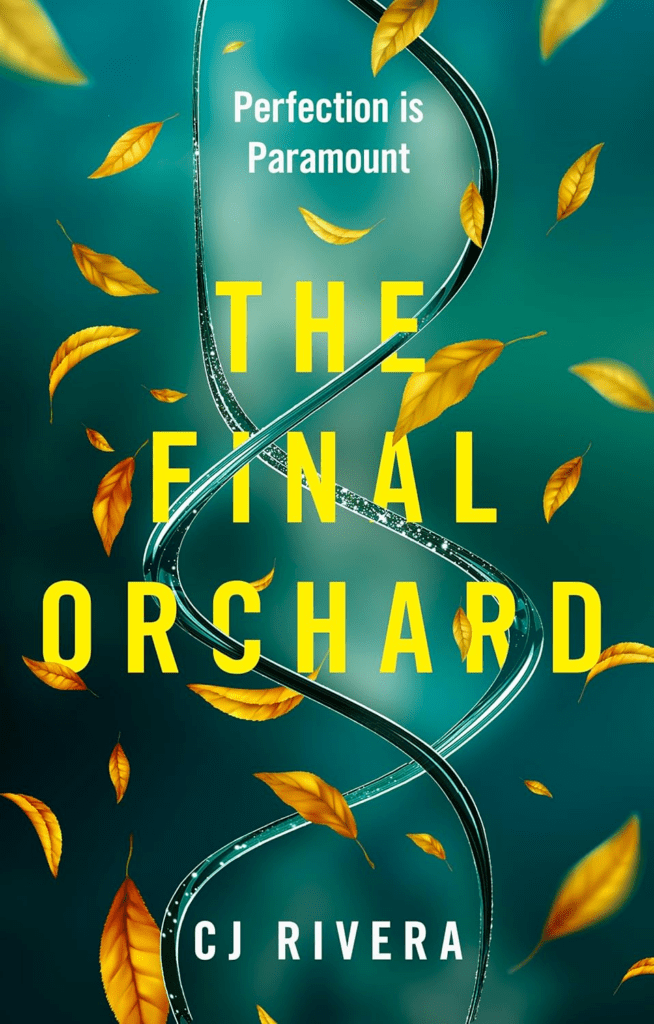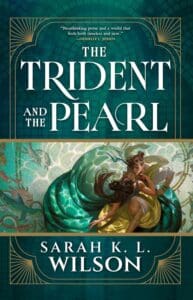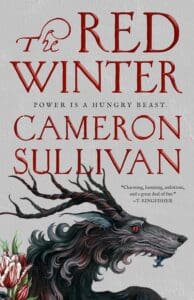
Author: CJ Rivera
Publisher: Angry Robot
Release Date: 11/12/2024
Genre: Science Fiction > Dystopian
Amazon: https://amzn.to/3AJbzqG
Blurb
From debut-author CJ Rivera, comes a harrowing tale of a parent risking it all for her child. The Final Orchard is perfect for those looking for a novel that captures them like television shows Silo and Black Mirror.
In a society where bionic enhancements are the epitome of wealth and power, scientific researcher Dr Rosio Arata threatens to topple the status quo with her pioneering organic enhancements. Yet when a horrific accident kills her daughter, Ro’s quest for answers leads her to becoming trapped in a twisted version of her life’s work.
In a bleak underground colony, sixteen year-old Ever is primed to rise through the ranks, gain selection and become a Saviour. It’s her dream to journey to the Surface and fight the army of Forms overwhelming the globe, catching up with the boy she loves in the process. Yet nothing in this world is what it seems and soon the secrets buried in her bunker begin to unravel, threatening the future of everything.
“Two women—one trapped in a dystopian society underground, the other in a bio-hacked future of her own making—face impossible choices in The Final Orchard and its twisty, helix-shaped plot adorned with thorny questions about agency, identity, and technology.”–Lauren C. Teffeau, author of Implanted
Real vs Fake: The Paradox of Perfection in The Final Orchard
As a millennial who has watched beauty trends shift over the decades, one thing is clear: the standards for “perfection” never stand still. Beauty ideals shift the moment they become accessible, pushing us toward the next unattainable goal. Not long ago everyone wanted the lean and sculpted look, with perfect noses and larger breasts. Today, lip fillers and Brazilian butt lifts dominate the beauty landscape. But this constant evolution isn’t new—it’s been happening for centuries. Beauty ideals have always cycled between extremes: from shapely to slender, natural to exaggerated, and back again. The pursuit of perfection is a paradox—just as the masses near one standard, a new one emerges, keeping perfection always just out of reach.
I wanted to explore this paradox in The Final Orchard, where this endless chase for perfection reaches new heights in a world dominated by bionic enhancements. But when everyone can achieve “fake” perfection, the new beauty ideal is to be “real”— if you can afford it. In this society, elites replace their artificial AI modifications with genetically engineered organics—”real” augmentations— bringing beauty trends full circle, back to a “natural” look that’s anything but.
The Influence of Wealth on Beauty Standards
Throughout history, wealth has always played a pivotal role in shaping the standards of beauty and perfection. In the Renaissance, a fuller figure symbolized fertility, health, and, more importantly, privilege. To afford the food and leisure required to achieve this ideal look was a luxury for only the wealthy. In The Final Orchard, I expanded on this theme, imagining a future where elaborate bionic enhancements, or Adornments, are used as a status symbols, much like luxury goods today. While some augmentations serve life-saving purposes, many are purely elective, used by elites to flaunt their wealth and extend their lives. Just as Renaissance fullness was a privilege, these futuristic enhancements signify both beauty and power.
The Ever-Shifting Beauty Ideal
Beauty ideals often push people toward extremes that are impossible to reach without intervention, from the tightly laced corsets of the Victorian era to modern cosmetic procedures. In the 19th century, the hourglass figure, with its exaggerated contrast between waist, bust, and hips, was achieved through unnatural means, like corsets that dramatically altered the body. Similarly, in recent decades, we’ve seen a return to extreme curves, popularized by figures like Jennifer Lopez and Kim Kardashian. These ideals often rely on advanced technology—implants, waist trainers, and other cosmetic enhancements—that create proportions far from natural. I wanted The Final Orchard to push this to further extremes. In this world 130-year-old women are transformed to look as if they are in their 40s, encased in jewel-encrusted adornments. Men sport chrome, chiseled chests, while others have delicate bionic hands designed specifically for eating endangered lobster. These futuristic modifications serve as more than aesthetic enhancements; they represent the ultimate fusion of wealth, status, and beauty. Like the Victorian corset or modern cosmetic surgeries, these modifications reshape bodies far beyond the natural. As technology advances, beauty becomes more about an unattainable ideal.
The Shift to “Natural” Perfection
Today, we claim to celebrate “natural” beauty, but even this ideal is shaped by subtle enhancements. Trends like “no-makeup makeup,” fillers, and Botox create an “effortless” beauty that’s anything but. So the paradox deepens: as artificial perfection becomes more attainable, the desire shifts toward a more “real” appearance, but even that is carefully curated. The Final Orchard explores this shift as well. The elite search for new ways to stand out. Enter “Organix”—genetically engineered body parts that look like idealized versions of natural traits. At an exclusive gala, guests preview these upgrades, which come with custom options, like enhanced lung capacity for swimmers, and advanced eyesight for precision tasks, etc. Some guests argue these new organic adornments are unnecessary, while others see them as the next frontier in perfection. The novel suggests that this “real” perfection is just as manufactured as the bionic enhancements it replaces.
The Role of Technology and Social Media in Shaping Beauty
Social media and AI filters fuel our obsession with flawless images. As more people turn to cosmetic enhancements to meet these ideals, the pressure for a perfect appearance is more intense than ever. This was another aspect I wanted to explore in The Final Orchard. At one point we learn about a social media influencer who falls from a balcony while trying to capture the perfect shot, pursuing an idealized image. And a trainer known for his “natural” strength is later revealed to have hidden bionic enhancements, showing the contrast between public personas and private realities. Here, social media doesn’t just encourage beauty standards—it pushes people toward risky and unethical choices in the name of perfection.
The Future of Beauty
Beauty standards don’t stay still. They’re shaped by culture, society, and technology, moving through cycles that reveal our shifting values around authenticity and aspiration. From the fuller Renaissance figure to today’s “natural” aesthetic, each era struggles with its own version of perfection. The Final Orchard imagines a future where artificial enhancements are fully embraced, only for the ultimate beauty ideal to return to something closer to “real.” This is my exploration of beauty in flux—a quest that reveals more about our insecurities than any ideal image we’re reaching for.
About the Author

CJ Rivera is an adult dystopian author navigating the realms of high-tech turmoil and stark reality. Before diving into speculative fiction, Rivera enjoyed a successful career as a Creative Producer. She has penned and produced captivating content for media giants such as CNBC, NBC Universal, and the Food Network. She lives in Washington, DC with her husband, three daughters and her hydroponic garden.




Leave a Reply